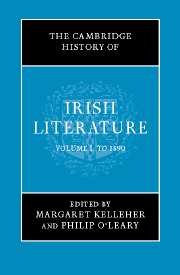Book contents
- Frontmatter
- Introduction
- 1 The literature of medieval Ireland to c. 800: St Patrick to the Vikings
- 2 The literature of medieval Ireland, 800–1200: from the Vikings to the Normans
- 3 The literature of later medieval Ireland, 1200–1600: from the Normans to the Tudors
- 4 Literature in English, 1550–1690: from the Elizabethan settlement to the Battle of the Boyne
- 5 Literature in Irish, c.1550–1690: from the Elizabethan settlement to the Battle of the Boyne
- 6 Prose in English, 1690–1800: from the Williamite wars to the Act of Union
- 7 Poetry in English, 1690–1800: from the Williamite wars to the Act of Union
- 8 Literature in Irish, 1690–1800: from the Williamite wars to the Act of Union
- 9 Theatre in Ireland, 1690–1800: from the Williamite wars to the Act of Union
- 10 Irish Romanticism, 1800–1830
- 11 Prose writing and drama in English, 1830–1890: from Catholic emancipation to the fall of Parnell
- 12 Poetry in English, 1830–1890: from Catholic emancipation to the fall of Parnell
- 13 Literature in Irish, 1800–1890: from the Act of Union to the Gaelic League
- 14 Historical writings, 1690–1890
- 15 Literature and the oral tradition
- Guide to major subject areas
- Index
- References
12 - Poetry in English, 1830–1890: from Catholic emancipation to the fall of Parnell
Published online by Cambridge University Press: 28 March 2008
- Frontmatter
- Introduction
- 1 The literature of medieval Ireland to c. 800: St Patrick to the Vikings
- 2 The literature of medieval Ireland, 800–1200: from the Vikings to the Normans
- 3 The literature of later medieval Ireland, 1200–1600: from the Normans to the Tudors
- 4 Literature in English, 1550–1690: from the Elizabethan settlement to the Battle of the Boyne
- 5 Literature in Irish, c.1550–1690: from the Elizabethan settlement to the Battle of the Boyne
- 6 Prose in English, 1690–1800: from the Williamite wars to the Act of Union
- 7 Poetry in English, 1690–1800: from the Williamite wars to the Act of Union
- 8 Literature in Irish, 1690–1800: from the Williamite wars to the Act of Union
- 9 Theatre in Ireland, 1690–1800: from the Williamite wars to the Act of Union
- 10 Irish Romanticism, 1800–1830
- 11 Prose writing and drama in English, 1830–1890: from Catholic emancipation to the fall of Parnell
- 12 Poetry in English, 1830–1890: from Catholic emancipation to the fall of Parnell
- 13 Literature in Irish, 1800–1890: from the Act of Union to the Gaelic League
- 14 Historical writings, 1690–1890
- 15 Literature and the oral tradition
- Guide to major subject areas
- Index
- References
Summary
For the poet Thomas Kinsella, ‘silence, on the whole, is the real condition of Irish Literature in the nineteenth century’. It is a common view, an Irish version of the dissociated sensibility of the modern poet: as a result of the colonial traumas of political and sectarian oppression, famine, emigration and the decline of the Irish language, the Irish poet became, in Kinsella’s words, the ‘inheritor of a gapped, discontinuous, polyglot tradition’. Far from suffering in silence, however, the Victorian period saw much English-language Irish poetry published not only in Ireland, but also in Britain or America. From the post-Romantic ballad and the translated Gaelic song, through the sectarian or political squib, to the renovation of narrative and epic in the conditions of a growing national culture reinvigorated by antiquarian and linguistic research, a number of poets sought ways of writing original poems in English in a distinctly Irish style. The quality of this writing may be uneven, but its interest lies in the way it either marks or attempts to mask its gaps and discontinuities, and in how its polyglot tradition creates the new.
Since 1801 Ireland had ostensibly been an integral part of the United Kingdom, but it was a major source of political instability for an imperial British state undergoing the cultural and scientific golden age associated so strongly with Queen Victoria. While a number of Irish writers saw that culture could assist political integration, many others refused, and the period up to the Literary Revival saw a hardening of the dividedness that would result in both independence and the partitioning of the island.
- Type
- Chapter
- Information
- The Cambridge History of Irish Literature , pp. 500 - 543Publisher: Cambridge University PressPrint publication year: 2006
References
- 6
- Cited by



